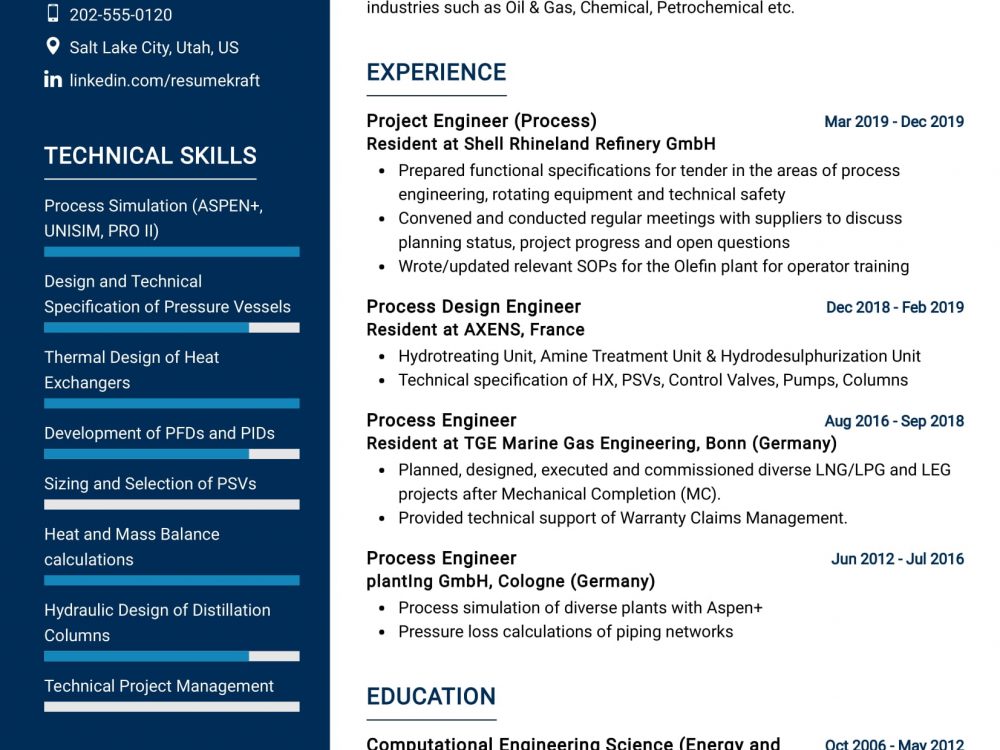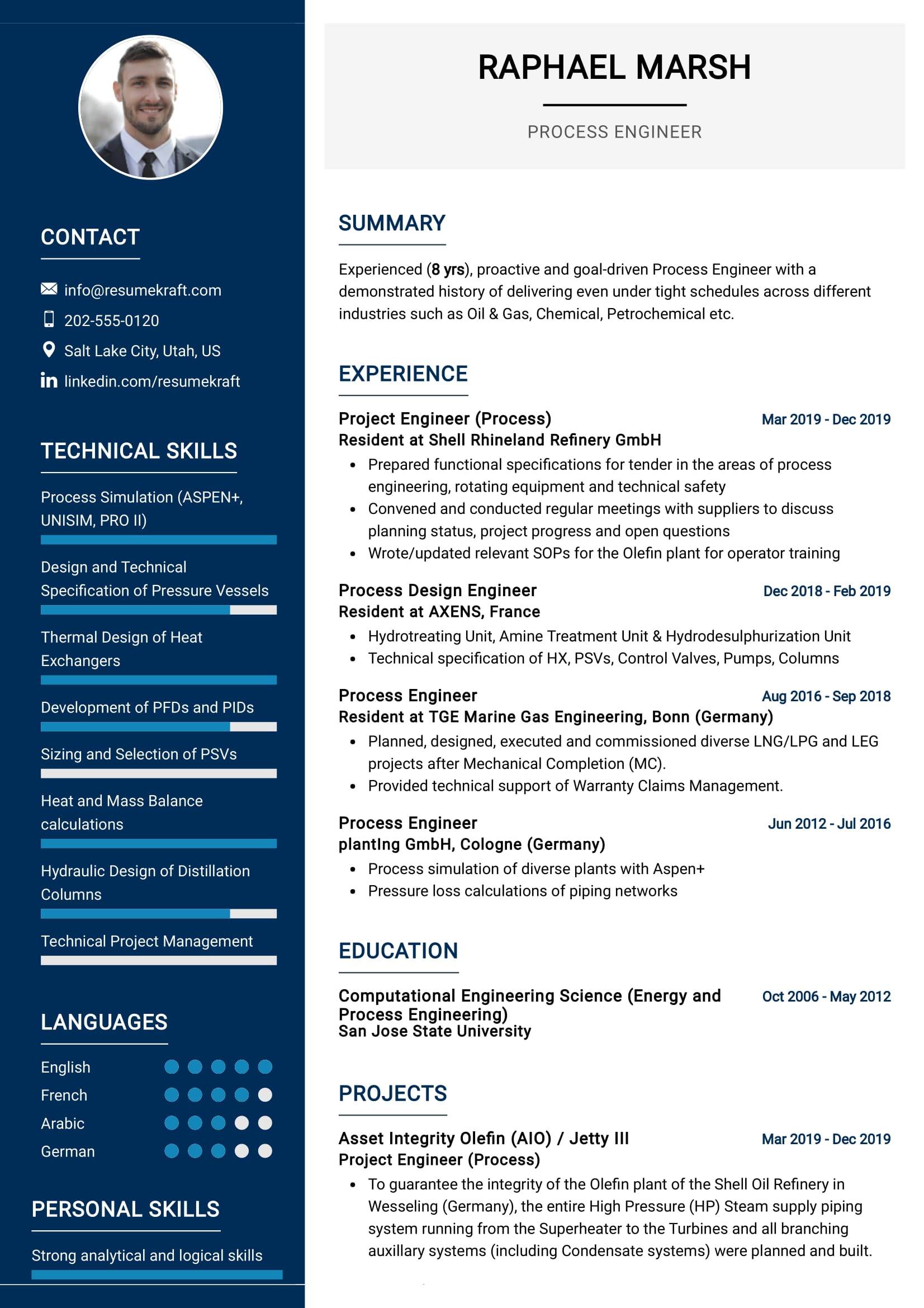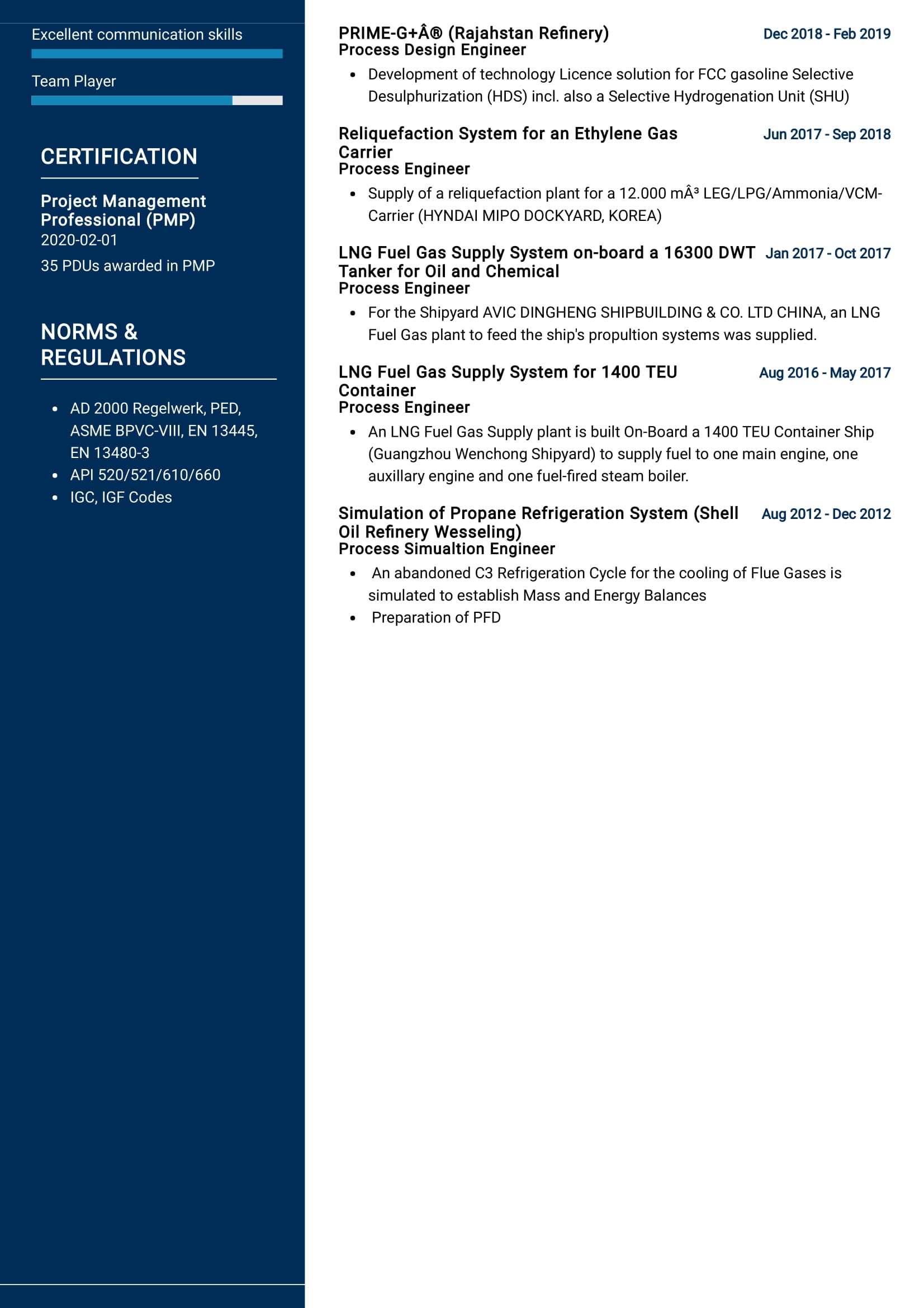What Should Be Included In A Process Engineer Resume?
A process engineer resume should include a summary of the applicant’s experience, education, and skills. It should also incorporate relevant job experience and technical expertise. The applicant should include a list of accomplishments, and any awards or professional certificates they may have earned. Process engineers should also provide a detailed description of their roles in the past, and any software or other technologies they have used.
When writing a process engineer resume, applicants should demonstrate their ability to troubleshoot and solve technical problems. This can be done by providing examples of troubleshooting and problem-solving techniques they have used. Additionally, applicants should highlight their ability to work with and lead teams, as well as their aptitude for multitasking.
It is important for process engineers to include details about their management skills and experience. This can include their ability to manage projects, as well as their ability to monitor and track data. In addition to this, process engineers should list any relevant software or other tools they have used to optimize the performance of their teams. Process engineers should also include any professional development courses they have taken and any certifications they may have earned.
Finally, process engineers should include any other information that may be relevant to the position they are applying for. This could include any publications they have written, as well as any research or development work they have done. Additionally, they should list any relevant certifications or awards they have received. By including this additional information, applicants can demonstrate their commitment to their work and their commitment to the industry.
What Skills Should I Put On My Resume For Process Engineer?
Having the right skills for a process engineer is essential for landing a job in this highly competitive field. Process engineers work in a variety of industries and are responsible for designing, monitoring, and improving industrial processes, from the production of goods to the delivery of services. As such, having the right skills and qualifications on your resume is key to demonstrating your value as a process engineer.
When writing your process engineer resume, it’s important to highlight key skills that will make you stand out from other applicants. This includes technical skills such as knowledge of process engineering equipment and software, as well as soft skills such as problem solving and communication.
In terms of technical skills, you should include any experience you have with process engineering equipment, such as boilers, pumps, heat exchangers, and other components. You should also mention any software you have used to simulate and analyze process engineering systems.
In terms of soft skills, you should emphasize your ability to solve problems, as this is an important part of the job. You should also include any experience working in teams, as process engineering often requires collaboration. Furthermore, good communication skills are essential for process engineers, as they often need to explain technical processes to non-technical people.
Overall, having the right skills on your resume for process engineer is essential for getting hired. Make sure to highlight any technical skills you have with process engineering equipment and software, as well as your problem-solving and communication abilities. With these skills, you’ll be sure to stand out from other applicants and get hired for the job.
What Is The Job Description Of The Process Engineer?
The job description for a process engineer can vary depending on the industry in which they work, but all process engineers are responsible for optimizing production, quality, and efficiency. This means they must analyze, troubleshoot, and improve all aspects of the production process. They may create and manage production plans, design process flows, and use various types of software and analytics to optimize production.
Process engineers also need to be knowledgeable in engineering principles such as thermodynamics, heat transfer, fluid mechanics, and engineering economics. They must be able to read and interpret technical documents such as schematics, production plans, and maintenance manuals. Additionally, they should have strong communication and problem-solving skills.
In addition to the technical aspects of the job, process engineers must also be able to plan and manage projects. This includes creating project timelines, coordinating with other departments, and monitoring progress. They must also be able to work with other engineers to ensure that the project is completed within the designated timeframe.
The process engineer resume should include any experience with process improvement, as well as any technical certifications or qualifications. It should also include any experience with process engineering software and analytics. Prospective employers will be looking for applicants with strong technical skills, as well as the ability to manage projects and communicate effectively.
What Is A Good Objective For A Process Engineer Resume?
A process engineer resume objective should highlight key skills, experiences and qualities that demonstrate a candidate’s ability to succeed in the role. A good objective should be succinct and tailored to the job being applied for. It should also make clear how the position will benefit the candidate as well as the employer.
When writing the objective, include relevant skills such as problem-solving, analytical thinking and multitasking. Be mindful to demonstrate your knowledge of industry trends and regulations pertinent to the job. Additionally, mention your willingness to collaborate and work effectively with other departments and teams.
It is also important to include your ability to manage multiple projects and prioritize tasks. This is especially important in process engineering as the job often requires managing and optimizing processes and systems. Demonstrate your expertise in process engineering tools and techniques, as well as your expertise in working with data and analytics.
Finally, emphasize your commitment to organizational success by mentioning your ability to achieve production goals and improve process efficiency. This will show the recruiter that you are an asset to their team and will be determined to drive their organization forward.
What Are 5 Responsibilities Of A Process Engineer?
Process engineering is a critical field of expertise in a variety of industries. The Process Engineer is responsible for the design, operation, optimization and maintenance of the processes necessary to produce a product. They must have the knowledge and ability to analyze processes and systems from multiple perspectives, in order to identify areas for improvement and cost savings. A Process Engineer must also be able to reconcile various types of data, and be able to present their findings in an understandable manner.
- Designing processes: A Process Engineer must have the skills to design and implement processes and systems that are efficient, cost-effective, and compliant with industry regulations. They must have the ability to plan and design process flows, analyze data and create reports, and develop and maintain process documentation.
- . Monitoring and improving processes: Process Engineers are responsible for the monitoring, control, and improvement of processes. They are involved in the development of systems and processes that are designed to improve productivity and efficiency, while also ensuring compliance
- Developing performance metrics: Process Engineers are responsible for developing performance metrics that can be used to measure the effectiveness and efficiency of processes. These metrics can be used to identify areas for improvement, as well as to measure the success of changes.
- Implementing process changes: Process Engineers are responsible for implementing changes to processes in order to improve productivity and efficiency. This includes developing new processes, modifying existing processes, and developing new tools and technology to improve the process.
- Testing and troubleshooting processes: Process Engineers are also responsible for testing and troubleshooting processes to ensure that they are working properly and efficiently. This includes monitoring the process for any potential issues, addressing any issues that arise, and making necessary adjustments to ensure that the process is working as intended.
A Process Engineer must also have excellent communication skills, as they will need to present their findings to clients, stakeholders, and other personnel. They must also have the technical knowledge and expertise to complete their tasks. As such, a Process Engineer must have a strong background in process engineering and operational efficiency.
What Are The Career Prospects In The Process Engineer?
Process engineers are highly sought-after professionals in many industries, such as manufacturing, petrochemical, and industrial engineering. They are responsible for designing, developing, and improving processes, systems, and products to ensure they meet all safety, environmental, and quality standards. Process engineers are also responsible for overseeing the manufacture, production, and maintenance of process-related equipment and machinery. This can involve managing safety, quality, and waste management operations.
Process engineers must possess a high level of technical and analytical skills, as well as the ability to read and interpret engineering drawings, blueprints, and specifications. They must also have strong communication and problem-solving skills. Process engineers must also be able to think critically and creatively in order to identify opportunities for improvement and develop new processes.
The career prospects for process engineers are excellent. According to the U.S. Bureau of Labor Statistics, employment for process engineers is projected to grow by 11 percent through 2026. This is faster than the average for all occupations. Additionally, process engineers can find work in many different industries, giving them job security and the opportunity to explore a variety of career paths. As a result, process engineers are in high demand, and salaries can be quite lucrative.



